Disclaimer: This review is of the PS4 version of the game and was played on an original PS4.
Arguably, one of the greatest losses the video game industry has suffered after Disney’s wholesale acquisition of the Star Wars franchise and George Lucas’ Lucasfilm was that of Lucasarts. Known for being the breeding ground for oddball adventure games like The Secret of Monkey Island, the Sam & Max series, and Tim Schafer’s Grim Fandango, the company also worked on a bevy of titles based on Lucas’ works, from Star Wars to Indiana Jones… and mostly just those two. After Lucasarts was unceremoniously shut down in 2013, lingering only as a licensor with all staff fired and multiple in-development games stuck in Development Hell, Disney sought out third-party publishers to bring a galaxy far, far away to home consoles and ultimately gave the keys to a most unexpected successor.
Enter Electronic Arts (EA), a game distribution company known for two things: their heavy reliance on microtransactions and forcing developers to hit unreasonable deadlines, along with being voted one of the worst companies in America multiple times. Their first whack at Star Wars came in the form of DICE’s Star Wars Battlefront (a revival of Lucasarts’ own multiplayer shooter), where fans at launch derided the game’s severe lack of content. The second go-around, Star Wars Battlefront II, suffered the exact opposite problem. The game relied extensively (at launch) on microtransactions and glorified gambling through loot box mechanics to better oneself in the game or even unlock franchise mainstays like Darth Vader without needing to play for over 40 hours first. The situation was so extreme that it literally forced the hand of legislators across the globe to examine loot boxes as a whole and famously decry Battlefront II as a “Star Wars-themed online casino.”
With a new Star Wars game having recently fallen into our laps, all of this begs the question: given EA’s exclusive rights to produce Star Wars games and the shadowy board of investors and stockholders that force EA’s hand into meddling with projects to “maximize” profits, is it possible for a Star Wars game in 2019 to avoid these missteps? Is there hope that it can actually be good?
Sixty-six’ed
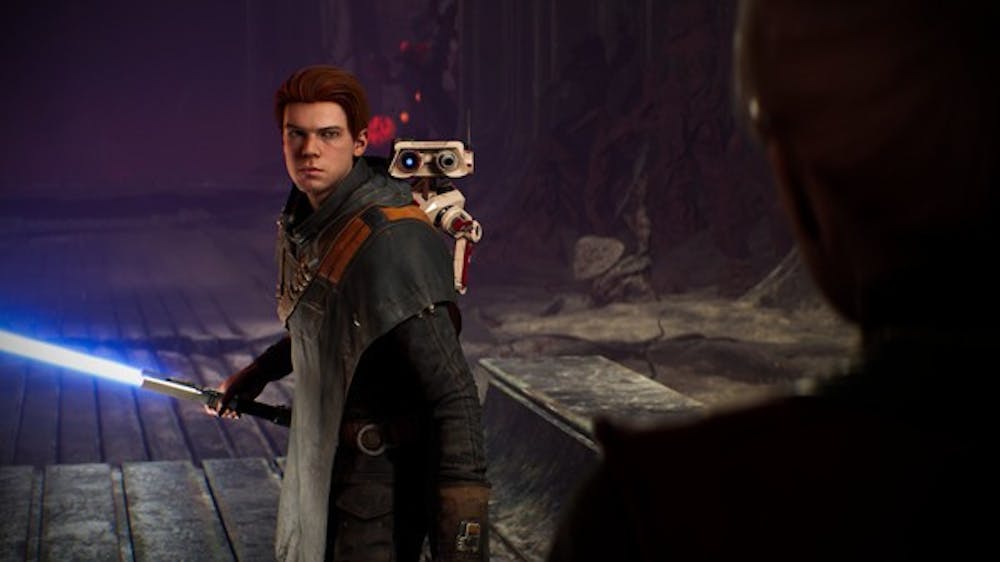
Image from Steam
Star Wars Jedi: Fallen Order, aside from being a fair contender for one of the jankier full titles in video game history, is a third-person action-adventure game from RESPAWN Entertainment, hot off the heels of the Titanfall franchise. Five years after the fallout of Revenge of the Sith and Order 66, former Jedi Padawan and walking sack of emotional baggage Cal Kestis has been hiding out from the insidious Empire as one of the last Jedi still in existence. However, after being outed and discovered by the Second Sister—a lightsaber-weilding savant in a dark helmet and slick cape who hunts Jedi alongside her band of like-minded Inquisitors—Cal goes on the run with Cere and Greez, a former Jedi and her wisecracking alien pilot, to find an artifact that could save the Jedi order… or lead to its’ very destruction.
To put it lightly, I genuinely didn’t expect myself to take to this game as much as I did on both a gameplay level—and a narrative level. Of course, this stuff isn’t Shakespeare, but it’s largely through dialogue and action how I gradually grew close to the rest of my motley crew and BD-1. BD-1 is, objectively, a glorified reason as to how you can regain health mid-fight. However, this little droid (that feels one-part shoulder parrot and one-part excited lapdog) genuinely grows on you, aside from the fact that it spends most of the game clinging to your back.
However, what astounded me about this Star Wars take was simply how groundedly dark it was. That’s not to suggest that the whole thing is a doom-and-gloom affair, no, but Jedi isn’t afraid to confront the true physical and emotional damage caused by George Lucas’s space wizard holocaust in a way that feels honest and unflinching for the most part. The ending does feel somewhat anticlimactic and sequel-bait-y, especially in comparison to the rest of the yarn, but I mean it when I say that this is the first Star Wars anything that genuinely moved me.
Using a little Force
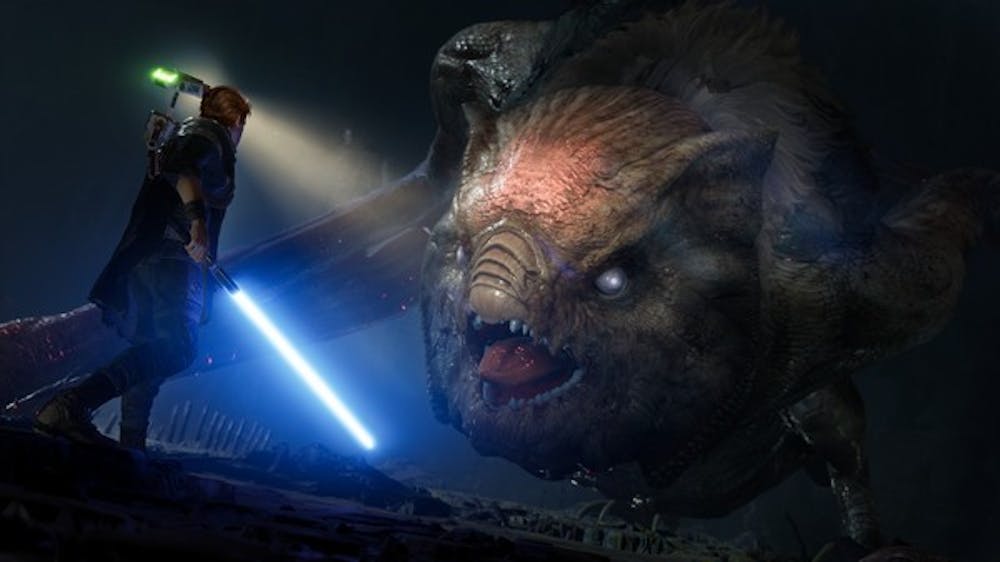
Image from Steam
Let me get this out of the way first: Jedi is far more than your typical Souls-like RPG. I’d dare say that the Souls-like elements of the game (losing all your experience after you die and having to land a hit on the guy who whacked you to get it all back without dying) are the weakest at play. In all honesty, this game has more in common with games like The Legend of Zelda: Wind Waker, Mass Effect, and Banjo-Kazooie of all things. The basic gameplay loop largely consists of going to a planet, fighting your way to an abandoned, dungeon-like temple, fighting off more guys, gaining a new ability, doing puzzles with said ability, and ultimately fighting your way back to the Mantis to shove off to another planet. Throw in a surprisingly large amount of platforming, mini-bosses, and backtracking, and that’s Star Wars Jedi: Fallen Order.
However, Jedi is far more expansive than that. Fights in this game are just as many puzzles as they are life-or-death squabbles with bucket-headed goons. Especially earlier on in the game, you’re forced to rely on just your saber and your quick wits to make mincemeat of your foes. As you go on, you and BD gradually gain more and more power, and it just continues to spice up combat or exploration in new and satisfying ways. The Force powers you get in this game feel just as weighty and powerful as each swing of your lightsaber. By the end of the game, you’re practically a master without even thinking.
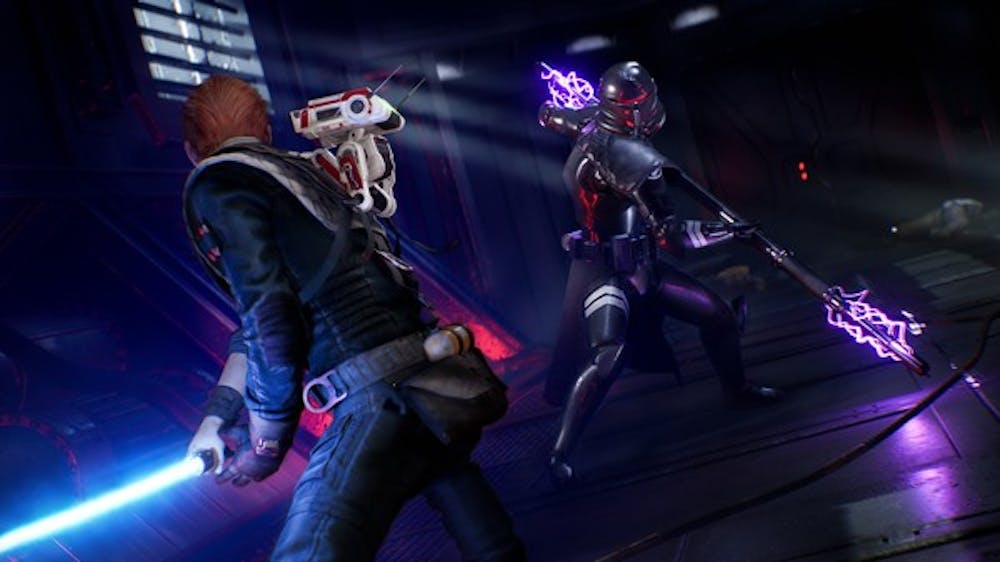
Image from Steam
Yet, just as much as the gameplay amplifies the experience, it’s the little things that truly sold me on this game. Every planet you visit is lush, stocked to the brim with detail and unique flora/fauna you can actually collect to plant on the Mantis’ miniature garden. The fact that you can fully customize your lightsaber down to the grips is a welcome touch, and I’m sure the people who dropped $200 to build a saber at Disneyland will be pleased to know that they can perfectly recreate their blade in-game—provided you find the parts, of course. The way BD-1 interacts with Cal’s body as he moves and oftentimes goes off on their own to scan things for your personal databank genuinely gives you the feeling that you aren’t alone on this journey as you face off against ever-increasing odds. Heck, you can customize everything down to the clothes on Cal’s back. The only minor gripe I have of the customization here is that you can’t switch Cal into anything besides his jumpsuit or his poncho. I fully realize that being chased down by space Nazi laser-swordsmen is no time to complain about fashion, but if I’m going to be gunned down a million times regardless, I’d at least like to look good while doing so.
As much as the presentation elevates the material beyond its relative simplicity, it’s those very same bells and whistles that often bring the ship crashing down to Earth. While I didn’t experience these issues judging from the playback of Jedi on a PS4 Pro console, playing the game on a regular-degular PS4 led to graphical hiccups around most every corner. Rapidly running through levels led to multiple instances of graphical pop-in, especially if the screen was dotted with Stormtroopers. The physics regarding Cal’s poncho were wonky at worst and unrealistically clingy at best, sometimes clipping through his shoulder and always clipping through his chair on the Mantis. On one occasion, I literally clipped through almost the entire level and ended up on the ground floor.
However, even with the scrappier elements of my experience with the game (both as intended by the developers and wholly unintended), it all felt perfectly in-character with the ragtag band of goons and weirdos I gradually amassed over the course of my playthrough. Sure, they diminished the interior facade of this being “real,” but it’s this scrappiness that ultimately reinforced what I feel this game truly is.
Truly, they were, a Star War
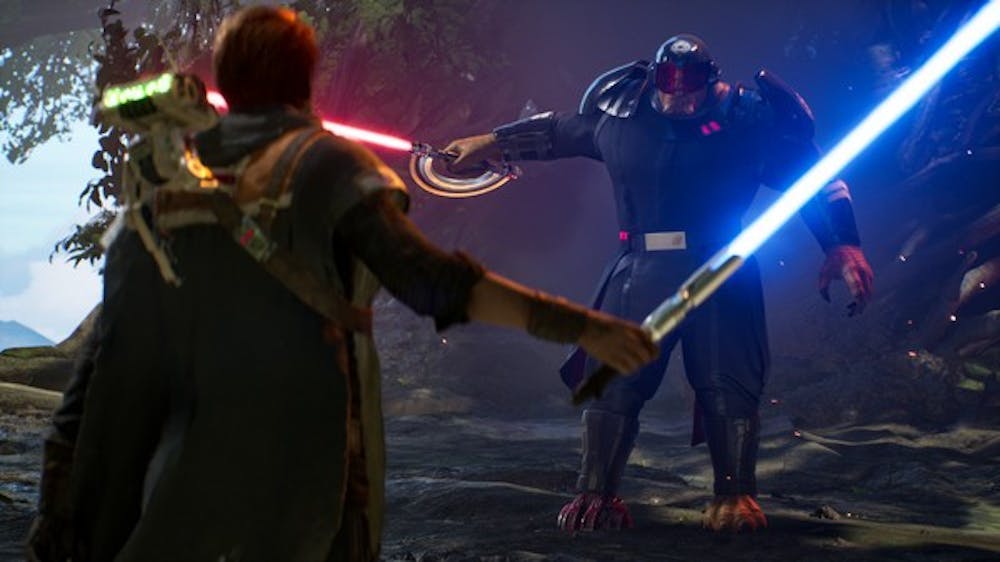
Image from Steam
Star Wars Jedi: Fallen Order reminds me most of the movie tie-in games that plagued the early 2000’s gaming market. It’s akin to games like Ice Age 2: The Meltdown: The Video Game, The Ant Bully: The Video Game, and James Cameron’s Avatar: The Game, where the aim was to attach the iconography and branding onto a jumble of vaguely related game mechanics borrowed from big name titles, all in the hopes of taking advantage of kids and naive parents (while hitting close deadlines on shipping). However, whereas those games lacked budgets, development time, and ultimately identities of their own, Jedi has them all…for the most part.
I stand by this game being a genuinely fun (and oftentimes rewarding) experience with interesting characters and an emotional core that even the movies haven’t tapped into (if not properly). It’s the first piece of Star Wars media I have seen in a long time that has left me genuinely shocked and emotionally invested in its plot. While I had to deal with multiple glitches on the standard PS4 version, some obtrusive design choices (unskippable cutscenes, no New Game +), and ultimately unnecessary gameplay mechanics, it’s all sour grapes in comparison to the sheer care and effort on the part of the developers to deliver a definitive Star Wars experience anybody can enjoy. If anything, it’s one of the greatest expressions of the potential for this world I’ve seen. It commands with the heart of a fan, and the soul of a creator. The dark side, and light. Now, that’s podracing.
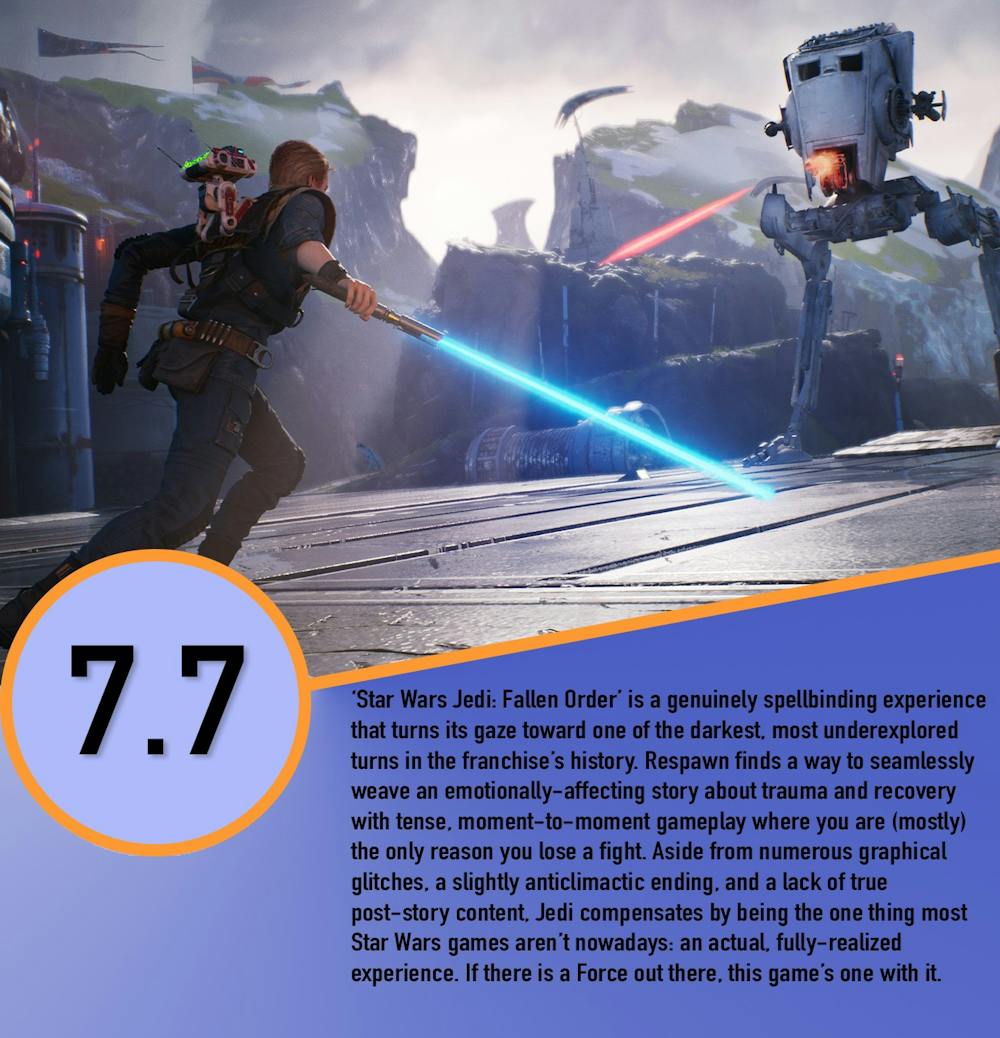
Image: Steam
Featured Image: TechRadar
For more entertainment related content, visit us at Byte BSU!




















